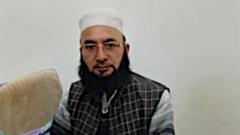Farooq Ahmed is heartbroken over the loss of his brother, Mohammad Iqbal, who tragically died on May 7 from cross-border shelling in Poonch, Indian-administered Kashmir. Iqbal, a respected teacher at Zia-ul-Uloom madrassa, became an unwitting victim not only of violence but also of public misinformation that falsely labeled him a terrorist. This unjust characterization arose after India retaliated against Pakistan for a deadly militant attack, resulting in cross-border hostilities that left significant civilian casualties.
In the aftermath of the airstrikes, media channels misidentified Iqbal, citing him as affiliated with terrorist groups based on nothing but his appearance. “It was like having salt rubbed into our wounds,” expressed Ahmed, highlighting the pain of losing a loved one compounded by defamatory narratives. “The dead can't defend themselves,” he lamented, as incorrect claims went viral across news platforms.
While Indian authorities confirmed the death toll included Iqbal among 16 victims in the conflict, media speculation spiraled out of control, fueling a “disinformation war” on social networks. The swift spread of inaccurate reports prompted Manisha Pande, managing editor at Newslaundry, to criticize the media’s irresponsible coverage, describing it as unprecedented in its sensationalism and intensity.
Days after Iqbal's death, Ahmed and his family were caught off guard by reports depicting Iqbal as a terrorist. A viral social media post shared broadcast of a major news outlet claiming Iqbal was killed in an attack on a “terrorist camp,” prompting public confusion and distress. The Poonch police issued clarifications to counter the false narratives, asserting Iqbal had no ties to any extremist groups, yet Ahmed felt the damage was irreparable.
While the police's statement aimed to rectify the situation, it came too late for the millions impacted by the misinformation. “What do we do now?” Ahmed asked, grappling with the financial burden of family responsibilities and the trauma of his brother’s misrepresented legacy. “The whole family depended on my brother. He was a gentle man who loved teaching children,” he reflected, emphasizing the stark contrast between Iqbal’s true character and the media's portrayal.
Facing a future without their sole breadwinner, Ahmed's family struggles with financial stability as they mourn. Despite considering legal action against the media outlets for defamation, financial constraints restrict their pursuit of justice. “For many people, my brother is still a terrorist whose killing is justified,” Ahmed mourns, calling for a deeper understanding of their pain and the inherent, destructive power of media narratives.


















